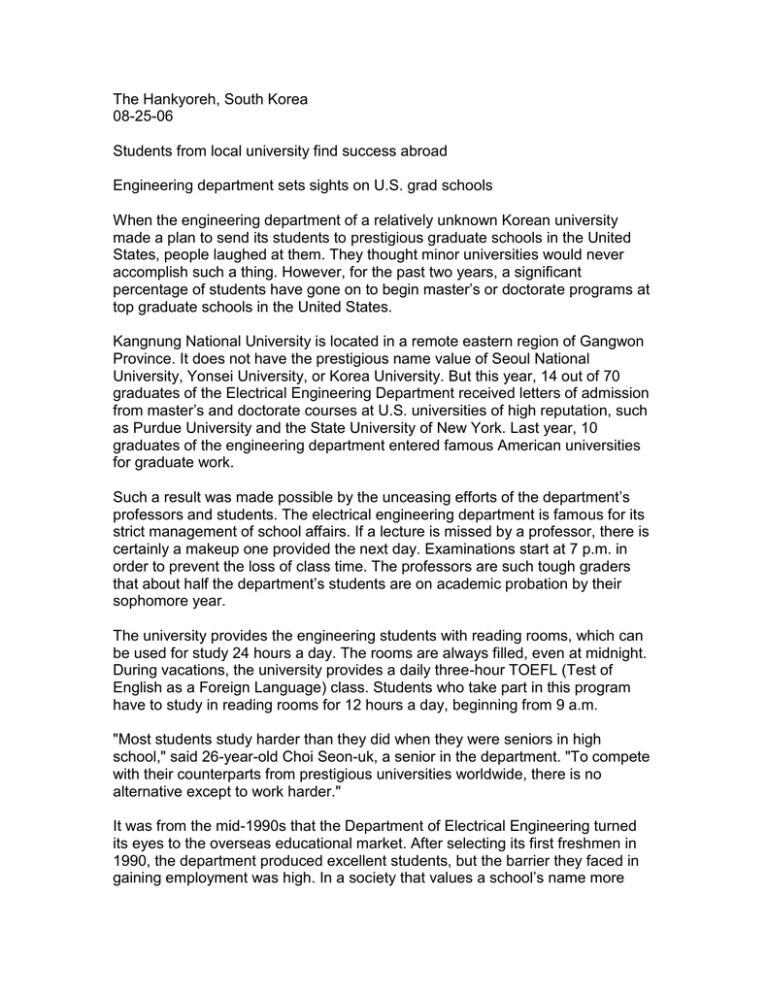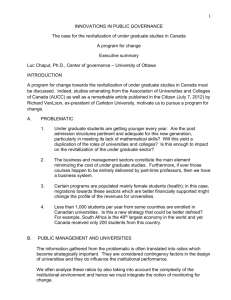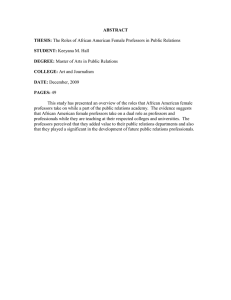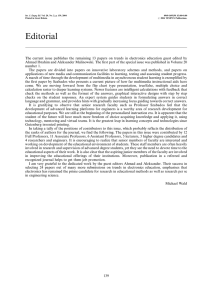The Hankyoreh, South Korea 08-25-06 Students from local university find success abroad
advertisement

The Hankyoreh, South Korea 08-25-06 Students from local university find success abroad Engineering department sets sights on U.S. grad schools When the engineering department of a relatively unknown Korean university made a plan to send its students to prestigious graduate schools in the United States, people laughed at them. They thought minor universities would never accomplish such a thing. However, for the past two years, a significant percentage of students have gone on to begin master’s or doctorate programs at top graduate schools in the United States. Kangnung National University is located in a remote eastern region of Gangwon Province. It does not have the prestigious name value of Seoul National University, Yonsei University, or Korea University. But this year, 14 out of 70 graduates of the Electrical Engineering Department received letters of admission from master’s and doctorate courses at U.S. universities of high reputation, such as Purdue University and the State University of New York. Last year, 10 graduates of the engineering department entered famous American universities for graduate work. Such a result was made possible by the unceasing efforts of the department’s professors and students. The electrical engineering department is famous for its strict management of school affairs. If a lecture is missed by a professor, there is certainly a makeup one provided the next day. Examinations start at 7 p.m. in order to prevent the loss of class time. The professors are such tough graders that about half the department’s students are on academic probation by their sophomore year. The university provides the engineering students with reading rooms, which can be used for study 24 hours a day. The rooms are always filled, even at midnight. During vacations, the university provides a daily three-hour TOEFL (Test of English as a Foreign Language) class. Students who take part in this program have to study in reading rooms for 12 hours a day, beginning from 9 a.m. "Most students study harder than they did when they were seniors in high school," said 26-year-old Choi Seon-uk, a senior in the department. "To compete with their counterparts from prestigious universities worldwide, there is no alternative except to work harder." It was from the mid-1990s that the Department of Electrical Engineering turned its eyes to the overseas educational market. After selecting its first freshmen in 1990, the department produced excellent students, but the barrier they faced in gaining employment was high. In a society that values a school’s name more than a graduate’s individual ability, Kangnung University has had to experience the difficult lot of a local university. Students fell into sense of loss, thinking that even if they made their utmost effort, it would be impossible for them to get a job. The department’s professors agreed that they should dedicate their lives to educating their students. Prof. Jo Myeong-seok said, "I wanted to plant within the students a sense of confidence, so that if they accumulated ability from that day forward, they could confront the world in a dignified manner." As a solution to free the students from the societal limits of their academic background, the professors set up a plan to send students to overseas universities. If the students possessed ability in both their major and in English, the professors reasoned, they should be able to enter graduate schools in the United States. Consequently, if they obtain an academic degree abroad, their abilities will be recognized in Korea. Above all, it was urgently important to remove the sense of loss from students unable to imagine a bright future because of their unvalued academic credentials. Professors asked students about their progress on a one-on-one basis almost daily. If there was time during classes, they encouraged their students by saying, "To enter a particular university is not an end, but a beginning. The most important thing in your life is to have a goal." The first fruits of their labor were seen in 1997, when a student from the electrical engineering department was admitted to a master’s program at Iowa State University. After that, in 2000 and 2002, one student, respectively, and in 2003 and 2004, two students, respectively, went abroad to study. Soon, entering prestigious universities in foreign countries was not just the story of other unversities’ students, and attitudes in Kangnung University’s electrical engineering department began to change. The students came to have a sense of confidence, and an increasing number of students became absorbed in their engineering and English classes. All of the students who finished master’s or doctorate courses in the U.S. have since been employed by prominent companies in and out of the nation, such as Intel, Samsung Electronics, and LG Electronics. Im Gu-bong, 27, who gained a job at Samsung Electronics in October last year after completing a master’s course in the United States, said, "Professors of our department are mentors who endlessly provide advice and give motivation for the students to find their own way." The Department of Electrical Engineering is preparing for a new challenge. "Whether or not you go abroad to study, our goal is to help our students to have ability in their major subjects and English so that they can win recognition from the nation’s major enterprises. We should realize that the college entrance examination doesn’t decide the life of a student. Our society should be an open one that can provide a second chance to young people."



